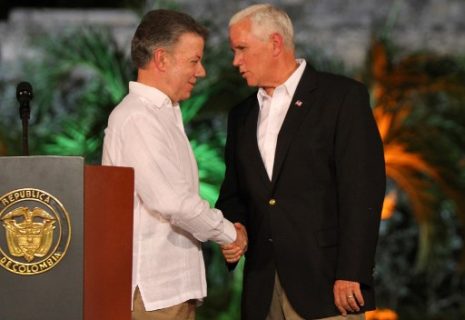
BOGOTA, Colombia (AFP) — The United States “will not stand by as Venezuela crumbles,” Vice President Mike Pence said Sunday, but he emphasized a peaceful path even as he stood by President Donald Trump’s startling warning that US military action remained a possibility.
“We have many options for Venezuela, but the president also remains confident that working with all of our allies across Latin America we can achieve a peaceable solution,” Pence said in a news conference alongside Colombian President Juan Manuel Santos, as he began a week-long Latin America tour of four countries.
His trip comes after Trump on Friday said he was mulling a range of scenarios for crisis-hit Venezuela — “including a possible military option if necessary.”
Trump’s comment drew condemnation from Caracas, which called the threat “reckless” and “craziness.”
The rest of Latin America — even countries strongly opposed to Venezuelan President Nicolas Maduro’s usurpation of his country’s democratic institutions — also strongly rejected it.
Santos re-affirmed that regional stance by saying he told Pence frankly “that the possibility of a military intervention shouldn’t even be considered.”
He added: “The Latin American continent, every country in Latin America, would not favor any form of military intervention.”
Seeking Venezuela’s ‘isolation’
Colombia, Venezuela’s neighbor, is a stalwart US ally and a fierce critic of Maduro and his policies.
But it and many other Latin American countries have bitter memories of past US adventures in the region, including invasions, the propping up of military dictators and the sponsorship of guerrilla groups and paramilitaries.
Pence’s trip to Colombia, Argentina, Chile and Panama was dominated by US efforts to find joint action with Latin American partners to increase pressure on Maduro.
Washington has already imposed unilateral sanctions on Maduro and nearly two dozen of his officials over the establishment of a new loyalist body, an all-powerful Constituent Assembly, that supersedes the legislature controlled by the opposition.
Specifically on the threat of military action, Pence said: “President Trump is a leader who says what he means and means what he says.”
But he emphasized his trip was “to marshal the unprecedented support of countries across Latin America to achieve by peaceable means the restoration of democracy in Latin America, and we believe it is achievable by those means.”
Eclipsing other issues
Trump’s stated possibility of a US military operation looked likely to shadow Pence at every stop, eclipsing bilateral issues, especially trade, that he was raising along the way.
In Venezuela, Maduro’s regime has seized onto Trump’s threat as proof of its oft-repeated claim that the United States wanted to topple the current leftist government to get its hands on Venezuela’s oil reserves, the largest in the world.
The Venezuelan opposition coalition seeking to oust Maduro through early elections on Sunday also rejected “the use of force, or the threat of applying such force, by whatever country against Venezuela,” in a statement.
Venezuela’s leftist allies Bolivia, Cuba, Ecuador and Nicaragua meanwhile all backed Venezuela in a confrontation against its “imperialist” foe.
Venezuela’s economy is heavily reliant on its oil exports, and shipments to the US — its biggest customer — account for 40 percent of its crude production, but only eight percent of American oil imports.
The US sanctions so far have been against individuals and not targeted Venezuela’s oil industry, which would have consequences for US refineries.








